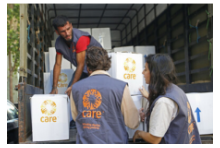CARE: Lebanon - Urgent Call for Support as Conflict Escalates and Humanitarian Needs Soar
, CAREThe intensity of the wide-scale airstrikes that started on Monday, September 23 has caused a state of panic in the country. The number of displaced people almost doubled in three days: around 100,000 people had been internally displaced over the past 12 months, and that number rose to 200,000 following this violent escalation. Lebanon, a small country already grappling with multiple crises—including the devastating 2020 Beirut Port explosion and nearly five years of economic collapse—has seen its resources and capacity to cope pushed to the brink. The situation is critical in a country already in the throes of an economic catastrophe. Almost half the population (44%) was already below the poverty line in 2024, many suffering from food insecurity. Civilians are bearing the heaviest burden, with women and girls disproportionately affected.
The road to recovery from this latest wave of destruction will likely take decades. Displacement is occurring on a massive scale, and the situation is deteriorating by the hour. In Beirut, residents live in constant fear of the conflict escalating further and air strikes intensifying. Each new explosion triggers panic, as families struggle to figure out how to protect themselves and their children, and how to secure basic necessities like food and medicine. Roads leading to the capital are gridlocked with vehicles as families flee from the south in search of safety. What is normally a short journey has turned into an ordeal, with families stranded in traffic for over 17 hours. The capital is overwhelmed by the influx of people seeking refuge.
The people of Lebanon are showing immense solidarity, stepping up with community-led initiatives, organizing door-to-door aid, and mobilizing supplies through social media platforms. However, the scale of the crisis far exceeds what the population can manage on its own. External support is urgently required to complement these efforts. Coordination between the government, international and local NGOs, and the private sector is crucial for providing the necessary assistance.
There are currently 602 collective shelters, namely schools turned into shelters, though the number is also increasing hourly. The school year has not started in Lebanon and is expected to be interrupted as schools are being turned into shelters to accommodate the large influx of displaced families and communities. The living conditions in the shelters are very precarious, with most families in a state of shock and urgently needing food, hygiene products, mattresses, and water for drinking and showers. The Lebanese government has asked the humanitarian community to help identify additional places to host collective shelter because they are running out of places.
CARE’s Response
In response to this escalating crisis, CARE and its partners are working around the clock to provide emergency relief to internally displaced people (IDPs) in shelters across Beirut, Mount Lebanon, and northern Lebanon. Key areas of CARE's immediate assistance include the distribution of bottled water, hot meals, hygiene kits, and dignity kits.
Recent indiscriminate attacks have also targeted critical infrastructure, including hospitals, ambulances, and bridges, partially blocking access to certain villages and hospitals for the population, complicating humanitarian efforts.
Nevertheless, CARE aims to continue to provide essential humanitarian services for vulnerable groups, especially women and children, who are disproportionately affected by the ongoing violence. In the first phase of their relief efforts, CARE distributed hygiene kits to 200 families and provided 9,000 liters of water to five shelters in the Beirut area. These shelters currently house between 150 and 370 people each. Moving forward, CARE will continue to deliver hot meals, hygiene kits, and dignity kits to the shelters to meet the growing needs.
This latest conflict escalation has compounded Lebanon’s collective trauma, particularly given the lasting effects of the 2020 Beirut Port explosion and the 2006 war. The humanitarian needs are growing exponentially, and many thousands of families remain displaced, with urgent requirements for shelter, food, water, and protection. CARE has been on the ground since the conflict intensified, working alongside other NGOs to address these needs, but the scale of the current crisis is unprecedented, requiring a significant increase in efforts.
To further support the affected families of the northern region and aim in their livelihood recovery efforts, CARE is seeking to mobilize support from our partners to provide the following:
• Food packages ($30/package for a family of 5 for a month). This includes rice, bulgur chickpeas, oil, canned food, tomato paste, etc.)
• Dignity kits for women and girls ($30 US dollars/dignity kit for women including sanitary pads, feminine hygiene soap, soap, etc. for 1 month)
• Hygiene kits ($35/a hygiene kit including soap, shampoo, toothbrush, laundry washing powder and dishwashing liquid, towel, toilet paper, etc. for a family of 5 for 1 month)
• Hot meals ($250 = 100 hot meals for 100 people)
As the conflict and crisis continue, the needs on the ground are becoming overwhelming. Thousands of displaced families have left everything behind, many with no homes to return to, and are now relying on the support of humanitarian organizations for survival. The immediate priorities include the provision of shelter, clean water, food, and hygiene kits.
CARE and its partners remain committed to scaling up our emergency response to meet the rapidly growing humanitarian needs. However, these efforts are not enough without additional support from international partners.
The situation is urgent, and the time to act is now. Your support is crucial in providing immediate resources needed to alleviate the suffering of Lebanon’s displaced population and prevent further loss of life. Thank you for considering supporting CARE’s relief and response efforts.
